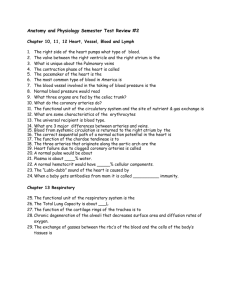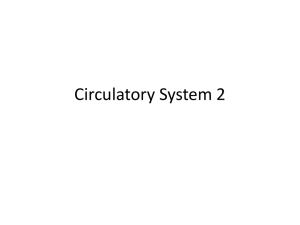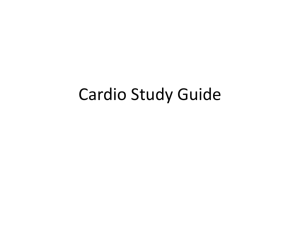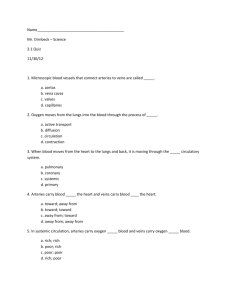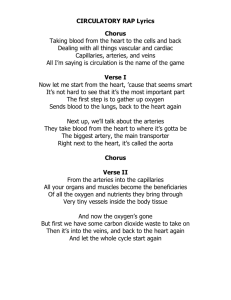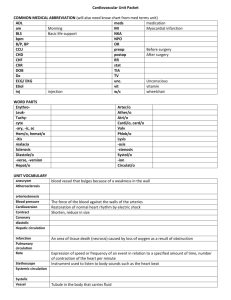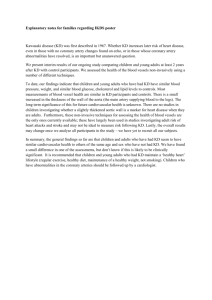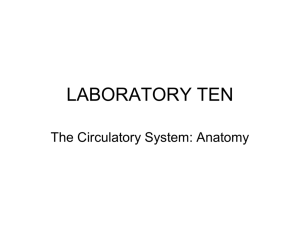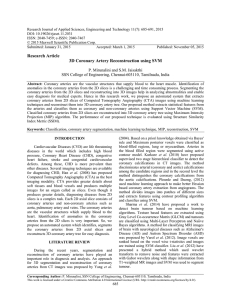Pre-Dissection Activity
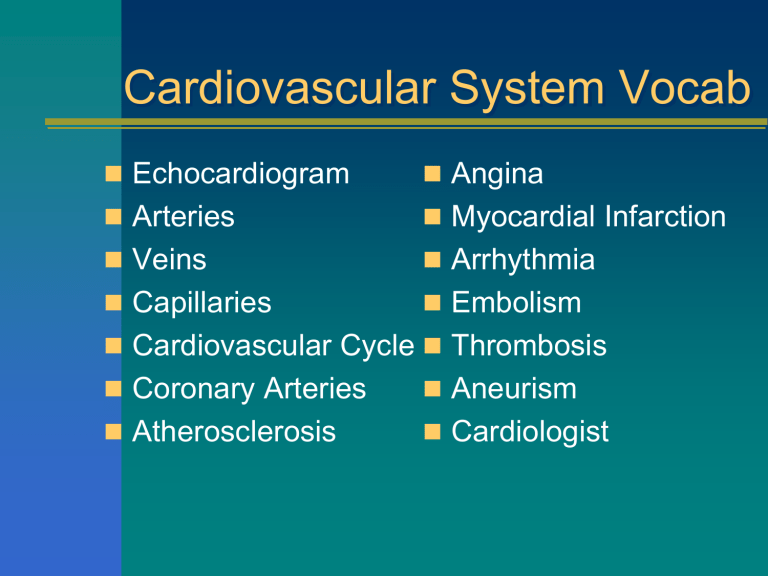
Cardiovascular System Vocab
Echocardiogram
Arteries
Veins
Capillaries
Angina
Myocardial Infarction
Arrhythmia
Embolism
Cardiovascular Cycle Thrombosis
Coronary Arteries Aneurism
Atherosclerosis Cardiologist
Arteries
Carry blood AWAY from the heart
All BUT pulmonary arteries carry oxygenated blood
Aorta: largest artery; 1 inch in diameter
Arterioles: smallest arteries
Coronary arteries: most important; supply blood to the heart muscle
Veins
Carry blood TOWARD the heart
All BUT pulmonary veins carry deoxygenated blood
Layers much thinner, less elastic
Series of internal valves that work against the flow of gravity to prevent reflux
Superior and inferior vena cava: largest veins
Venules: smallest veins
Tiny, microscopic vessels
Walls one cell layer thick
Function: to transport and diffuse essential materials to and from the body’s cells and the blood
Capillaries
Did you know…
You have approximately
100,000 miles of blood vessels in your body
Enough to circle the earth 4 times
Cardiovascular Cycle
Coronary Arteries
Coronary arteries supply the heart with oxygen
If one or more become blocked, a heart attack can occur.
Bypass surgery is grafting arteries and veins taken from others areas the body to “bypass” or restore circulation to the blocked coronary artery
Coronary Artery Disease
Atherosclerosis – narrowing and stiffening of arteries due to fatty deposits
Angina – chest pain relieved by rest, sign of inadequate blood supply to heart
Heart Attack – (MI or Myocardial Infarction) cardiac muscle deprived of blood and oxygen due to a blocked artery
MedicineNet.com
Percutaneous transluminal coronary angioplasty is a surgical procedure in which a balloon catheter is inserted into a blocked blood vessel to increase the blood flow of that vessel.
Narrowed artery with balloon catheter positioned.
Inflated balloon presses against arterial wall.
Circulatory Disorders
Embolism – material that breaks away from its original site that causes a blockage
Thrombosis – blockage of an artery or vein due to a blood clot
Aneurism – abnormal swelling of a weakened arterial wall that makes it bulge out like a balloon
Cardiovascular
Technician
•
•
•
•
•
Set up and administer EKGs, stress tests
Prepare patients for ambulatory monitoring
Edit and deliver final test results to physicians for analysis
Schedule appointments
Transcribe physicians' interpretations
1 year certificate programs prepared student for certification exam
EKG - Electrocardiogram
EKG records electrical activity of the heart
Cardiovascular
Technologist
•
•
•
•
Performs EKG
Performs Echocardiograms
Discuss image results with the physician
Help physicians during invasive procedures, such as inserting catheters (small tubes)
Record findings and track patient records
Echo - Echocardiogram
2 year associate degree
Ultrasound equipment used to create images of the heart and blood vessels
Cool “Heart Sites”
Echocardiogram simulation http://en.wikipedia.org/wiki/File:Apikal4D.gif
Heart Attack Video http://video.about.com/heartdisease/Heart-Attack.htm
NOVA-Cut to the Heart: http://www.pbs.org/wgbh/nova/heart/heartmap.html
Go With the Flow http://www.smm.org/heart/videos/top.html#bypass
Heart Transplant Video http://www.orlive.com/montefiore/videos/heart-transplant-procedure
